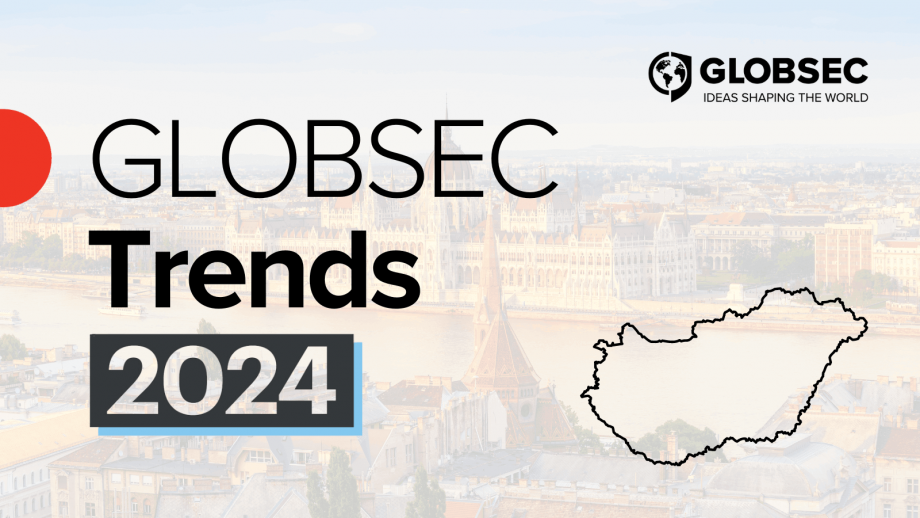GLOBSEC Trends 2024 Hungary: Looking West with some reservations

Despite some local political actors questioning the utility of Hungary’s membership in Western institutions such as the EU or NATO, GLOBSEC Trends 2024 polling highlights that Hungarians strongly favour remaining a part of the Western institutional system, even if they have some reservations about certain policy choices of the West, not independently of the local political context. While last year’s report on Hungary focused on the polarisation of society, this year, the main attention is on points of consensus, some concerning overall trends and changes in public perception of Hungarian democracy.
GLOBSEC Trends 2024 summarizes polling data on 9 Central and Eastern European countries: Bulgaria, Czechia, Estonia, Hungary, Latvia, Lithuania, Poland, Romania, and Slovakia. Respondents were asked about the EU, NATO, Ukraine, strategic partners and threats, democracy and the perception of various societal groups. The poll does not only allow for highlighting regional differences, but some questions are used to track changes in public opinion over time. In Hungary, the polling in 2024 was conducted by Publicus on a representative sample of 1,000 people in mid-February 2024 through computer-assisted telephone interviews (CATI).
Please, see the highlights of the Hungarian results below, while the entire report in English is available here.
A wink to the East
Consensus in Hungary has long existed on two key questions; namely, the country’s membership in the EU and NATO. 86% of respondents want Hungary to stay in the former and 91% back membership in the latter. Hungarian respondents understand the benefits of NATO, as 80% agree that it lowers the possibility of a foreign nation attacking their country.
When it comes to strategic partners, Hungarian respondents clearly see Germany as the country’s number one partner, as at least 50% of them picked Berlin in each year since 2021. At the same time, the country’s population regularly picks an eastern power as Hungary’s second most important partner: Russia was overtaken in second place by China in 2024. Perception of China as a strategic partner is extremely high in Hungary in a regional comparison with 34% selecting Beijing. The second strongest result for China regionally is 16% in Slovakia. This clearly highlights the success of the Hungarian ruling party’s strongly pro-China rhetoric and the announcement of numerous Chinese investments in the Hungarian economy. The relatively positive views on the East are mirrored in threat perception as well: only 47% of Hungarians see Russia as a threat, and only 27% believe China to be one.
Wary of Ukraine
Ukraine is one of the most contentious issues in Hungarian domestic politics, with the ruling parties arguing consistently for cutting military and financial aid to Kyiv to achieve peace – a narrative different from that of most EU partners. They also have strong reservations about Ukraine’s EU and NATO membership. Public opinion partly reflects the ruling party’s messages: While the majority of Hungarians (55%) do see Russia as the primary culprit for the war, only 36% see Ukraine as a member of the EU, NATO or both in the future. Notably, over 50% say that the West is provoking Russia by delivering military aid to Ukraine.
A lack of trust
Most Hungarians agree that democracy is a good form of governance for the country, but many are dissatisfied with how democracy is working in practice. Satisfaction with democracy peaked in Hungary in 2022 at 54%, which fell to 36% over the past two years. Parallelly to this, Hungarians’ trust in their government collapsed from 55% to 39%. This is not the only area where Hungarian respondents showed a lack of trust in the country’s institutional system: only 34% trust standard, mainstream media. It should be highlighted that the understanding of what media outlets the aforementioned category covers seems to be different in Hungary compared to the rest of the 9 polled countries. While in general in the CEE region, those who trust mainstream media tend to show more pro-Ukraine views, in Hungary, the situation is the exact opposite of this. As noted above, 36% of Hungarians see Ukraine’s future in the EU, NATO or both, which drops to 18% among those who trust the mainstream media. Thus, many Hungarian respondents seem to consider pro-government outlets uncritically disseminating the ruling party’s views to be the mainstream.
Finally, a key takeaway from Hungary is that smear campaigns do not always work. In the country, some political forces have regularly attacked civil society, the LGBTI community and immigrants. Trends results show that only 21% of respondents see civil society organisations (CSOs) as foreign agents, while 58% support ensuring the rights of the LGBTI community, such as the right to marriage. However, on migration, Hungarians resonate more with prevalent anti-migration narratives: only 23% agree that migrants from other countries are needed to make up for the workers’ shortage in certain economic areas.
Overall, Hungarians clearly want to be in the western institutional system, and they value democracy. However, when it comes to aligning with the geopolitical decisions of the West, especially on Ukraine, Hungarian respondents are less supportive and are more impressionable by certain narratives. This selectiveness is present concerning opinions on various societal groups as well: attacks on CSOs and the LGBTI community fall on largely deaf ears, but anti-migration sentiments are firmly anchored in Hungarian society.
